
In-person activities are the most widely used and effective means for recruiting interns, according to results of NACE’s 2025 Internship & Co-op survey.

Moving to skills-based hiring opens opportunity for a broader demographic of students to access positions where they otherwise would not meet the qualifications. Many employers include skills development in their internship programs to enhance their interns’ career readiness and bolster conversion.

More than 70% of organizations expect to increase or maintain intern hiring, according to NACE’s 2025 Internship & Co-op Report. However, overall intern hiring is expected to fall 3.1%.

To persist toward successful conversion of interns, organizations must not view engagement as a 10-week summer pursuit. Instead, engagement must gain momentum through recruiting and pre-internship, accelerate during the internship itself, and be maintained after interns return to campus.

Relocation assistance may be the secret sauce to attracting top-notch interns.

When students responding to NACE’s 2024 Student Survey were asked to identify the obstacles preventing them from participating in internships, their responses revealed they attributed their decision to a lack of time, concerns over pay, and scant opportunities.

There are several factors linked to the decision to convert for Class of 2024 graduating seniors, according to results of NACE’s 2024 Student Survey.

Hyster-Yale Materials Handling is developing a pre-onboarding program to engage and build excitement among its interns prior to their start date next summer.

Data suggest that providing interns with relocation assistance correlates to better conversion rates for organizations that hope to turn interns into full-time hires.

Disney provides resources to the College Fund to administer the latter’s scholarship program, called the Future Native Storytellers Program. Recently, a smaller group of program scholars was selected to receive additional enhancements to increase the awareness of opportunities at Disney for Native students.

This past summer, Arup expanded its career readiness programming for summer interns by working with its internal learning and development team to implement a series of competency-focused workshops.

Liberty Mutual has found that one of the most effective ways to maintain or strengthen connections with prior interns when they are on campus is to meet them where they are, such by hosting meetups, dinners, or coffee chats on or near campus.

The percent of graduating seniors who participated in an internship is the highest that NACE has recorded in the past six years, according to results of NACE’s 2024 Student Survey.

There are interesting data points from NACE’s 2024 Recruiting Compensation Report in terms of budgets, internship offers, and retention that provide insight into the operations and approaches of URR functions.

With professional pursuits, quality invariably outweighs quantity, so career services staff should work with students to find good fits rather than trying to meet arbitrary deadlines.

Global Atlantic Financial Group, the small employer winner of the 2024 NACE Recruiting Excellence Award, addressed a pressing need for increased diversity and innovation and a robust talent pipeline.

NACE is conducting a quick poll and would like your input to assess ways that campus recruiting may be impacted. Last spring, we saw increased campus protests and lockdowns in response to student activism. As we prepare for the fall semester and campus recruiting, there is a potential for increased campus unrest in response to global and national events (i.e. Presidential election, war in Middle East). This Quick Poll is intended to get an overall understanding of the ways university recruiters and campus career centers are preparing for possible campus unrest related to the recruiting process.

The conversion rate for interns fell, fueled by a lower offer rate. The lower rate could reflect lower-than-expected hiring needs or could signal an issue with the intern selection process.

Northwestern Mutual shifting the focus of its internship program to development of career readiness competencies seemed like a natural progression since the company was already focusing on themes similar to those identified by NACE’s competencies.

Landmark College, an institution exclusively for students who learn differently including those on the autism spectrum, champions a strengths-based model and gives students the skills and strategies they need to achieve their goals.
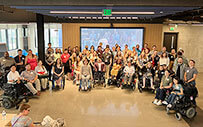
Winner of the 2024 Chevron Innovation Award, the Gregory S. Fehribach Center at Eskenazi Health empowers Indiana college students with physical disabilities to achieve equitable employment following graduation.

Hiring for internships is expected to remain stable this year, according to NACE’s 2024 Internship and Co-op Report. Overall, eight out of 10 employers taking part in NACE’s annual benchmark report expect to maintain (47.2%) or increase (32.2%) the number of interns they bring in for 2023-24 compared to the 2022-23 academic year.

Because Liberty Mutual Insurance hires hundreds of interns a year, it equips interns with a wide range of skills and has the skill profile of an intern closely align with its early career roles to prepare interns for potential future full-time roles.

Visa’s internship program is designed to build full-time conversion and provide an exceptional experience for incoming talent. Phill Haig, Visa’s director of early career programs, says Visa’s target conversion rate has been 70%.

Hourly wages for interns have kept pace with inflation, signaling the value of these programs to employers.

Interns who feel committed to the organization because they were well treated are 7.14 times more likely to accept an offer of full-time employment.

Women remain underrepresented in computer science majors and careers. Two researchers conducted a study to see how women in computing experience and make sense of their internships, and how their internship experiences shape their future career plans.

Some have the mistaken idea that credit means internship experiences can’t or shouldn’t be paid. Affecting all students but especially those struggling with finances, unpaid, for-credit internships require the student to pay for the credit and forgo a paycheck. Employers can and should pay their interns, regardless of whether the student gets academic credit for participating.

Visa has found that hiring diverse talent is easier to accomplish the earlier it can engage students and it helps create a network of brand evangelists who are able to advocate for Visa on campus.

The Williams Companies evaluates talent for internships based on the NACE Career Readiness Competencies, focusing on the competencies where it has seen gaps in its intern class.

Last year, Progressive Insurance achieved an intern conversion rate of 91%, far exceeding the overall conversion rate of 57.6% for 2021-22.

Due to their underrepresentation in the classroom and societal messaging around technology being a “masculine domain,” women in computer science often feel isolated and marginalized. A study demonstrates how women’s experiences in computing internships shape their future career decisions; the findings have implications for both career development professionals and employers who recruit entry-level talent.

As we enter the new school and recruiting season, NACE is conducting a Fall Quick Poll. The focus of our poll is on two important issues– the impact the end of Affirmative Action is having on our work and state of unpaid internships.
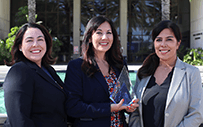
CSU Fullerton’s “I Am First” program teaches first-generation students how to create social capital through a curriculum that empowers students to cultivate agency in their career search.
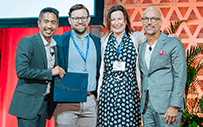
The Villanova University Disability Inclusion in the Workplace Conference is a half-day program designed primarily with hiring employers in mind to help them build disability inclusion into internship and entry-level hire experiences.

Data provided by more than 2,300 bachelor’s degree-level graduating seniors who took part in NACE’s 2023 Student Survey demonstrate that systemic inequities continue to exist in internships—not only in terms of who takes part, but also in terms of who gets paid.
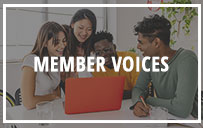
Internships can provide students with valuable professional skills but also a professional network, which can be even more valuable upon graduation.

Dominican University, a Hispanic-serving institution with 64% of students identifying as Latinx and located just outside of Chicago, launched its successful career development program in its Brennan School of Business in fall 2017.

The SPARK grant at Nazareth College is open to first- and second-year students to encourage and support early engagement in experiential learning.

This gain underscores the value employers place on their internship programs and their commitment to them.
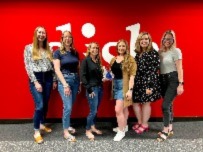
The large-employer winner of the 2023 NACE Award for Recruiting Excellence, DISH’s “Recruit Once, Hire Twice” college recruiting process brings in top interns and works to convert them into full-time hires.

A new $1 million gift supporting career development at William & Mary will triple the number of students annually who can receive university funding for unpaid and underpaid internships.

Through its Experiential Learning Platform™, Saxbys builds individualized academic partnerships to open cafes that provide exceptional paid experiential learning opportunities for students.

The University of Illinois at Chicago College of Engineering Job & Internship Fair Tours were created to engage more first- and second-year students in job fairs and to reduce barriers to attendance.

A University at Buffalo program uses project-based internships with local nonprofits to promote collaboration, interdisciplinary exchange, and the value of social innovation among graduate students.

Beyond ensuring diversity in the composition of their intern cohort, employers’ ability to convert their interns into full-time hires is a critical component to diversifying their workforce.

Employers overwhelmingly believe hosting internships is the recruiting strategy that yields the highest return on investment leading to entry-level hires.

Protiviti has long felt that setting up its interns for success from the moment they first power on their laptop during the summer session is integral. When Protiviti switched to a virtual onboarding model for its interns in 2020, it realized there was more that could be accomplished in the virtual setting with intentional planning.

There were gender and race disparities within the compositions of the 2020-21 intern cohort as the majority of students who take part in internships are men and identify as white, according to results of NACE’s 2022 Internship & Co-op Survey.

Launched in 2018 with a flagship two-day immersive conference, Workday’s “Future Females in Tech Engagement Program” helps women to build career confidence and make the connections they need to get started in the tech industry.

University of Idaho Career Services created the “Career Services Internship Certificate Program” approximately five years ago to give undergraduate interns the knowledge, skills, and abilities to transition to the professional workforce.

Regardless of how employers ran their programs in summer 2021, the hybrid model is their favored modality for their 2021-22 internships, according to NACE’s 2022 Internship & Co-op Survey Report.

Employers expect to boost their intern hiring by 22.6% for the 2021-22 academic year, while their hiring of co-ops is up 1.1% this year, according to results of NACE’s 2022 Internship & Co-op Survey Report.

Intern conversion is a business imperative at all times, but especially in the current job market, when many organizations respond to the impact of the coronavirus pandemic by shrinking programs and budgets.

While virtual internships are essential in the current work environment, it is important to recognize that many benefits of a traditional internship are lost when internships are done online, says Matthew Hora.

It’s true: What a student learns from an internship is most important. However, how important is it for a potential employer to know that a student was offered an internship even though the position was rescinded due to COVID-19?

The employers that could best weather the coronavirus pandemic in terms of their college recruiting programs will find ways to adapt to current conditions and still deliver on the aspects of their programs that are most important to college students.

Over time, cooperative education (also referred to as co-op/co-ops) has gained wide adoption in practice. Although the term “cooperative education” is used at many institutions, no generally accepted definition for this type of experiential education for higher education students exists. Co-op programs vary greatly in myriad ways.

Internships provide employers an opportunity to identify talent early: Indeed, according to NACE’s 2019 Recruiting Benchmark Survey Report, nearly all respondents (94 percent) said it was very or extremely important to identify talent early through internships.1

Employers play an important role in ensuring that college students are career ready and in developing the competencies that broadly prepare college graduates for this transition. “It’s a role that requires employer engagement with both students and college leadership,” explains Glen Fowler, a past president of NACE and, until his recent retirement, the recruiting and training manager for the California State Auditor’s office.

Position your internship program for success by ensuring your intern orientation provides a strong start for your interns. They will be able to make meaningful contributions to your organization, and your organization will establish goodwill with interns from the outset, putting you one step closer to conversion.

Rhonda Fisher Eaker and Alyssa Marks, Metropolitan State University of Denver, look at the effects of funding students for internships in fields where internships are traditionally unpaid.

NACE Community members share ideas for keeping interns who have accepted their job offers interested and excited until the first day of employment.

Can a current job also count as an internship? Several members of the NACE Community weigh in with their views.

Employer members in the NACE Community discuss the appropriate amount of time to give an intern to decide on an offer of full-time employment.

Uncertainty surrounds the use of artificial intelligence among university relations and recruiting professionals and, to a lesser extent, among career services practitioners.

Ellucian’s internship toolkits are intended to enhance the employee experience, while providing interns and their managers with key information and resources.

What, if anything, do you give your interns to welcome them to their internship or help them remember their intern experience?

The University of Washington created an intern performance evaluation template that it shares with employers, and on and beyond campus.

NACE offers suggestions for getting the most out of your organization’s intern surveys.

How long do employers give interns to decide whether to accept an offer of a full-time position? Employers want to give soon-to-be graduates plenty of time to make their decision.

Through its University Professional Internship and Co-op Program, Clemson University provides 1,000 students a year with the opportunity to gain experience, defray expenses, and build career readiness competencies.

"When setting intern salaries, factors such as students’ major, functional area, degree, and year of study are important considerations.
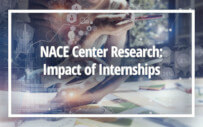
Free downloads from the NACE Center: These studies examine how internships impact the development and initial career outcomes of college graduates.

The key competencies employers want in the students they hire for internships are also among the skills employers help their interns to develop.

When it comes to selecting students for their internship and co-op programs, employers have a set of five competencies that are “must haves.

Through a grant program, Great Lakes Higher Education Guaranty Corporation is making internships accessible to low-income students.

Are students who repeat their internship experience with an organization more likely to convert to full-time hires? nearly 90 percent of eligible returning interns received an offer of full-time employment, and nearly 90 percent of those accepted. In comparison, just 43.5 percent of nonreturning interns were offered a job with their internship employer.

Document aspects of your organization’s internship program on an ongoing basis to, among other things, help you clarify what you do, how you do it, and why you do it.

NACE offers best practices for internship programs that feed full-time hiring, including recommendations for work assignments, work arrangements, housing and relocation assistance, and program management.

Successful strategies for converting interns into full-time hires. As the job market continues to improve, employers continue to look first within their internship programs for entry-level college hires.

Language is a key element of diversity, equity, and inclusion, and can help or hinder efforts in this area.

There are several key steps that organizations can take to best support “onlies” and provide a healthy space for them to excel at work.

Providing impactful professional development opportunities for interns can have positive implications for organizations.

NACE research suggests that internship and study-abroad experiences have a positive effect on the career readiness of first-generation students

Students feel that their experiential education assignments have a positive impact on their career readiness competencies.

The authors explore soft-skill development through internships.

The authors look at the similarities and differences in how college students and employers describe leadership and its various proficiency levels.

The NACE Center and SkillSurvey collaborated on a pilot project to determine how to best measure career readiness; results of the initial phase are highlighted.
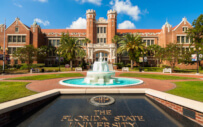
In summer 2019, Florida State University implemented an experiential education graduation requirement for all undergraduate students.

The likelihood of students becoming paid interns increases if they went to the career center for internship assistance.

The Stony Brook Center for Remote Internships & Experiential Learning provides practical resources for employers operating remotely during the pandemic and beyond.

Unpaid internships can put international students at risk of violating their immigration status.

Interns should be are aware of the law and understand what remedies are available should they believe they are being subjected to harassment in the workplace during their internship.

What constitutes harassment? How are employers required to respond? What should employees do if they believe they are being harassed? Are unpaid interns protected?

Employers may require new hires and interns to sign restrictive covenants, such as noncompete, nonsolicitation, and/or nondisclosure agreements. Attorneys George Hlavac and Ed Easterly discuss the issues.

Throughout the spring, the URR functions of employers in the transportation industry were particularly hard hit by the coronavirus pandemic.

PwC is providing its more than 3,600 summer interns with an experience that is preparing them for the new virtual world.

Following the Great Recession a little more than a decade ago, many organizations learned a costly, yet valuable, lesson.

NACE research shows that disproportionalities exist in terms of race/ethnicity and representation by internship attainment and pay type.

Companies that currently do not have jobs or internships should try to provide students with learning engagement support or development, and strive to make connections with them.

NACE research shows that women are overrepresented among unpaid interns and underrepresented among paid interns.

Swinburne University created the AccessAbility Careers Hub, which provides targeted career education for students with disabilities.

How do career centers handle alternative experiential learning experiences such as contests and hackathons that may not fall into a college’s or university’s internship bucket?

First-generation college students are overrepresented among “never interns” and underrepresented among paid interns.

In this new era of social distancing, what is replacing the firm, professional handshake?

CDK Global’s retooling of its internship offboarding process has expanded opportunities for interns to stay connected with the firm.

A nationwide survey of more than 500 college seniors and recent graduates found that those who engaged in cold networking were twice as likely to get an internship.

The DOL has released new guidelines around unpaid internships, replacing the six-part test with the primary beneficiary test.


Abbott Laboratories’ high school internship program exposes students from diverse backgrounds across the United States to STEM fields.

Although AOIC requires potential interns to be enrolled in college, in certain cases, summer interns who did not return to school because of COVID have been allowed to stay on.

Last spring, career services offices were asked about the main ways in which they were engaging students, as nearly all contact had become virtual. In addition to email, phone calls were a popular tool.

The value of Eaton Vance’s summer internship program is evident in the attention the firm dedicated to its transition to virtual last spring and its management last summer.

How do virtual internship programs compare with their pre-pandemic counterparts? NACE members share what they have heard from students about their virtual summer internship experiences.

NACE research shows that paid internships benefit students in their initial post-graduation job search: more job offers, higher starting salaries, and a shorter search. However, the data also show that this path to employment may be exclusive, with racial/ethnic minorities, women, and first-generation students all underrepresented in paid internships.
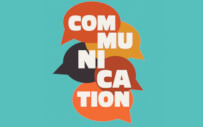
Research conducted by Aaron James and Troy Nunamaker, Clemson University, indicates that many students under- or overrate their communication skills, perhaps because they are assessing them in the context of an academic setting, not the workplace.

Offering regular activities keeps interns engaged with the organization, which is crucial, especially in a virtual environment.

Employers anticipate hiring fewer interns and co-ops this year than they did last year, according to NACE’s 2021 Internship & Co-op Survey Report.

Having a formal policy helps the team in the University of Oregon’s career center team with consistency when considering postings from employers seeking unpaid interns.

The average conversion rate for interns climbed nearly 20%, fueled by a substantial increase in the average offer rate, according to results of NACE’s 2021 Internship & Co-op Survey Report.

Many challenges with managing an internship program as a sole URR practitioner can be overcome by being resourceful, especially by involving colleagues.

More than 40% of employers are planning to hold a hybrid internship program this summer. Also, the highest percentage prefer to attend both in-person and virtual career fairs.

According to results of NACE’s 2021 Internship & Co-op Survey, an average of 62% of interns were white and nearly 58% were male.

The average hourly wage for bachelor’s-level interns has increased steadily since 2014. Despite the COVID-19 pandemic, that is the case again this year.

The New College of Florida’s SMAH Internship Program has a twist in its approach that distinguishes it from other programs that fund students’ unpaid internships.

The lessons Cree Wolfspeed’s URR team learned during the COVID-19 pandemic have helped inform their preparation for this summer’s program and beyond.

Amy Morrill Bijeau and Beverly Peters, American University, examine whether students can gain career readiness competencies through virtual internships. Their study compared student self-assessments and supervisor evaluations from those taking part in virtual, in person, and hybrid internship experiences.

One of the benefits of employers converting their interns to full-time hires is evident in employee retention rates.

The number of offers accepted by Cigna’s 2020 cohort of virtual interns indicates that the company’s conversion strategy was successful. There are several key reasons for this success.

During the pandemic, only 22% of college students took an internship, half were in-person positions, and quality indicators for online internships were low, according to a new study.

This fall, the majority of employers will be hosting their own virtual recruiting events, such as Zoom sessions, virtual tours, and virtual career fairs.

In response to the ongoing COVID19 pandemic, employers are most commonly offering a hybrid internship program this summer.

Many employers that shifted their internship programs to virtual during the pandemic plan to make virtual assignments part of their internship programs in the future.

Talent acquisition professionals provide insight and ideas on topics around internships, such as converting interns to FTEs, internship duration, and more.

The University of Nebraska at Kearney’s College of Business & Technology Career Center verifies internships to ensure they meet key criteria for their students.

Virtual recruiting provides a better job-search experience for historically marginalized populations than in-person recruiting, according to results of the NACE 2021 Student Survey.

Is experiential learning designed for Black students? Erica Lake’s study found that that Black students at PWIs perceive different college experiences from their peers and are not as engaged in experiential learning, even though they may be interested

Although some recommend a student or new graduate volunteer to work unpaid to gain experience, it is illegal for-profit organizations to have “volunteers” perform work.

There are a number of laws and regulations governing internships, including whether an intern is classified as an employee. Others cover compensation-related issues—including whether an intern can be paid if they receive credit—workplace safety, employment agreements, and more.

Employers committed to building a pipeline of diverse talent must consider how to diversify the makeup of their internship program.

Despite greater recognition of their negative impacts on the workforce, lack of diversity and an abundance of unpaid internships remain issues, says Anjali Lalani.

With an eye toward the future of its workforce, Mohawk Industries provides its candidates and new college hires with development that extends beyond the internship.